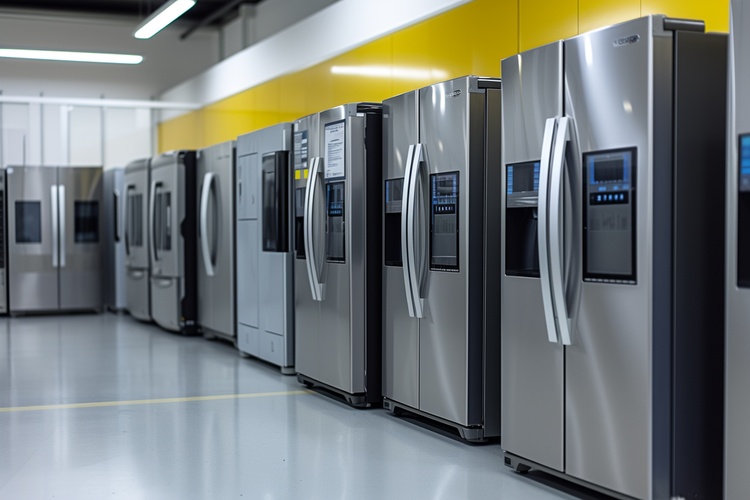Smart Refrigerator Technology and Features Explained
Modern refrigeration has evolved dramatically with the integration of smart technology, transforming traditional appliances into connected household hubs. These advanced appliances combine energy efficiency with digital connectivity, offering features that extend far beyond basic food storage. Smart refrigerators now include app-based controls, energy monitoring systems, and intelligent features designed to enhance convenience while reducing operational costs.

Smart Fridge with App Control Features
Contemporary smart refrigerators offer comprehensive mobile app integration that allows users to monitor and control their appliance remotely. These applications typically provide temperature adjustment capabilities, door-open alerts, and maintenance notifications directly to smartphones or tablets. Many models include internal cameras that stream live images of refrigerator contents, enabling users to check inventory while shopping or meal planning.
Advanced app control systems also incorporate voice assistant compatibility, allowing integration with Amazon Alexa, Google Assistant, or Samsung Bixby. Users can add items to shopping lists, set expiration date reminders, and receive maintenance alerts through voice commands or push notifications. Some applications offer recipe suggestions based on available ingredients detected by internal sensors or camera systems.
Energy-Efficient Smart Refrigerator Technology
Energy efficiency remains a primary consideration for modern smart refrigerators, with manufacturers implementing various technologies to reduce power consumption. ENERGY STAR certified models typically consume 9-10% less energy than standard requirements, while some premium models achieve up to 40% greater efficiency compared to conventional refrigerators manufactured a decade ago.
Smart cooling systems utilize variable-speed compressors and advanced insulation materials to maintain consistent temperatures while minimizing energy waste. Many models feature dual cooling systems that separately control refrigerator and freezer compartments, reducing temperature fluctuations and improving food preservation. LED lighting systems and high-efficiency motors further contribute to reduced energy consumption throughout the appliance’s lifespan.
Affordable Smart Fridge Options and Market Segments
The smart refrigerator market now includes entry-level options that provide basic connectivity features without premium pricing. Mid-range models typically offer essential smart features like app connectivity, temperature monitoring, and basic internal cameras starting around $1,500-$2,500. These affordable options often include standard refrigerator functionality enhanced with Wi-Fi connectivity and smartphone app integration.
Budget-conscious consumers can find smart refrigerators with fundamental features like energy monitoring, temperature alerts, and simple app controls. While these models may lack advanced features like multiple internal cameras or large touchscreen displays, they provide essential smart functionality at accessible price points. Many manufacturers now offer financing options or seasonal promotions to make smart refrigerator technology more attainable.
Smart Fridge Price Ranges and Cost Analysis
| Model Category | Price Range | Key Features | Energy Rating |
|---|---|---|---|
| Entry-Level Smart | $1,200-$2,000 | Basic app control, Wi-Fi connectivity | ENERGY STAR |
| Mid-Range Smart | $2,000-$4,000 | Internal cameras, touchscreen, voice control | ENERGY STAR Most Efficient |
| Premium Smart | $4,000-$8,000+ | Multiple cameras, large displays, AI features | Highest efficiency ratings |
Prices, rates, or cost estimates mentioned in this article are based on the latest available information but may change over time. Independent research is advised before making financial decisions.
Smart refrigerator pricing varies significantly based on capacity, features, and brand positioning. Entry-level models from major manufacturers typically start around $1,200-$1,500, while premium models with advanced AI capabilities and large touchscreen interfaces can exceed $6,000-$8,000. Mid-range options generally provide the optimal balance of features and affordability for most households.
Installation costs, extended warranties, and delivery fees should be considered in total ownership calculations. Some retailers offer package deals that include installation, removal of old appliances, and extended warranty coverage. Energy savings over time can help offset higher initial costs, particularly for households replacing older, less efficient models.
Smart Refrigerator Reviews and Performance Considerations
Consumer reviews consistently highlight connectivity reliability, energy efficiency, and build quality as primary evaluation criteria for smart refrigerators. Models with consistent Wi-Fi performance and intuitive mobile applications generally receive higher user satisfaction ratings. Temperature consistency, noise levels, and storage capacity remain fundamental performance factors alongside smart features.
Professional reviews often emphasize long-term reliability and manufacturer support for software updates. Smart refrigerators require ongoing firmware updates to maintain security and functionality, making manufacturer commitment to long-term support crucial for consumer satisfaction. Models with established track records for software maintenance and customer service typically demonstrate better long-term value propositions.
User feedback frequently mentions the learning curve associated with smart features and the importance of reliable home internet connectivity for optimal performance. Reviews suggest that households with stable Wi-Fi networks and comfort with technology adoption experience the greatest satisfaction with smart refrigerator investments.
Smart refrigerator technology continues advancing rapidly, with manufacturers regularly introducing enhanced features and improved energy efficiency. These appliances represent a significant evolution in kitchen technology, offering practical benefits through improved food management, energy savings, and enhanced convenience. As prices continue becoming more accessible and technology matures, smart refrigerators increasingly represent viable upgrades for households seeking modern appliance solutions with long-term value and functionality.




